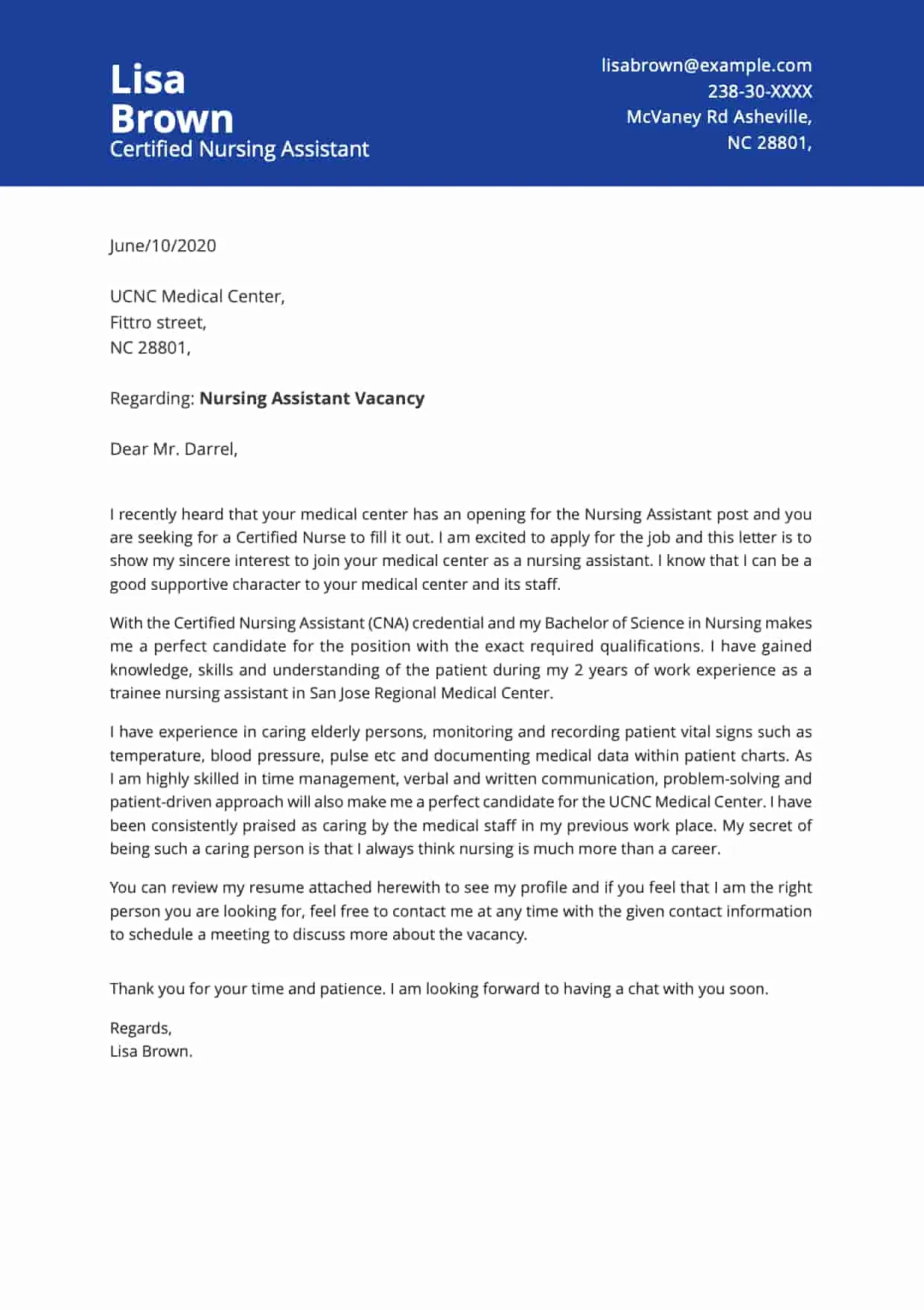Key Components of a Nursing Assistant Cover Letter
A well-crafted cover letter is essential for any Nursing Assistant seeking employment. It’s your first opportunity to make a positive impression and highlight why you’re the best fit for the role. This document should complement your resume, providing a more personal narrative and showcasing your skills, experience, and passion for caregiving. By following these tips, you can create a compelling cover letter that sets you apart from other candidates and increases your chances of landing an interview. Remember, each cover letter should be tailored to the specific job and the requirements outlined in the job description. A generic cover letter will not be as effective as one that is customized to the position and the healthcare facility.
Your Contact Information and the Employer’s
Begin your cover letter by including your contact information and the employer’s details. This section ensures the hiring manager knows how to reach you and demonstrates your attention to detail. Always prioritize accuracy in this section. Mistakes in your contact information can prevent the employer from reaching you, and errors in the employer’s address are unprofessional. This initial section sets the stage for a professional and organized application. Remember to always double-check that the information you’ve provided is up-to-date, including your phone number, email address, and mailing address.
Formatting Your Contact Details
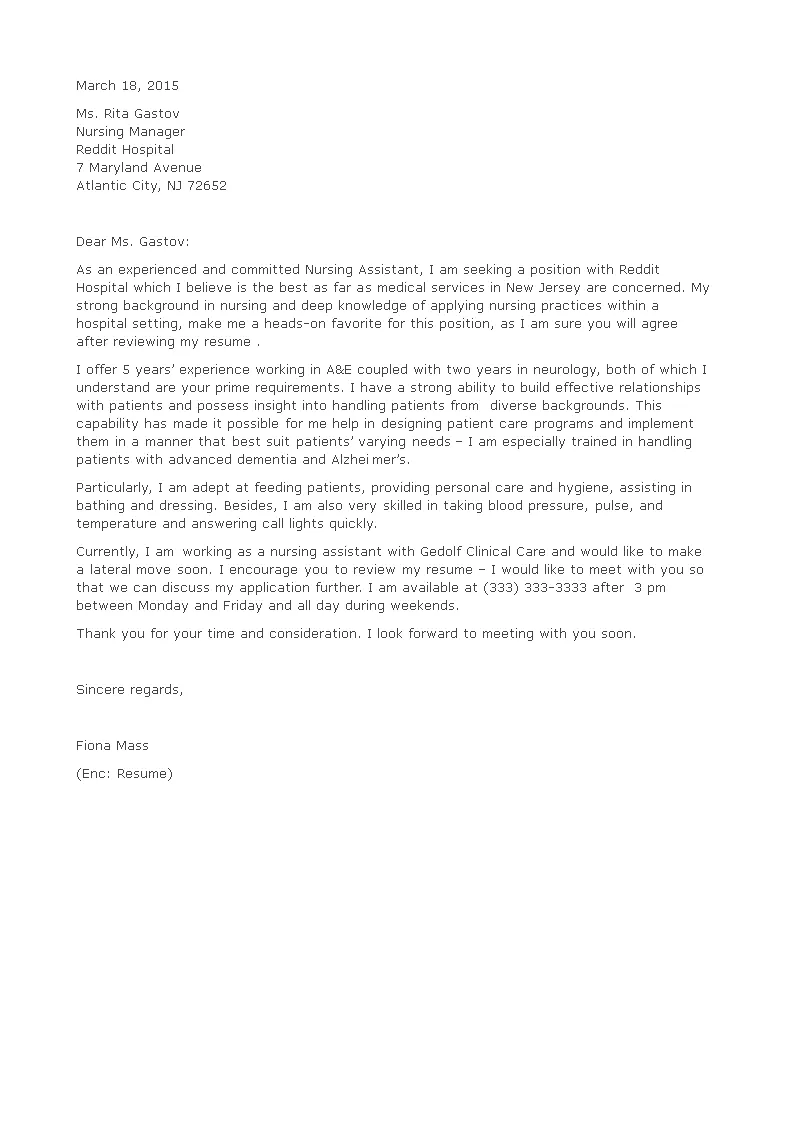
Format your contact information clearly at the top of the letter, usually on the left-hand side. Include your full name, address, phone number, and professional email address. Below this, on the right-hand side, include the date and the employer’s details: the hiring manager’s name (if known), their title, the name of the healthcare facility, and the facility’s address. Maintaining a clean and consistent format makes it easy for the hiring manager to find the information they need quickly. Choose a professional font such as Times New Roman or Arial. Ensure the font size is easy to read (typically 11 or 12 points), and maintain consistent spacing throughout your letter.
Addressing the Hiring Manager
Addressing the hiring manager correctly is crucial in making a positive first impression. Avoid generic greetings like “To Whom It May Concern.” Instead, personalize your cover letter by addressing the letter to a specific person whenever possible. This demonstrates that you’ve done your research and are genuinely interested in the position. Researching the hiring manager’s name shows initiative and a proactive approach to your job search. The effort to find the correct person adds a personal touch that generic letters lack, immediately setting you apart from other applicants and making a strong first impression. It signals your genuine interest in the role and the healthcare facility.
Finding the Right Person to Address
If the job posting doesn’t specify a contact person, conduct some research. Check the healthcare facility’s website for the human resources department or hiring managers. LinkedIn can also be a valuable resource; search for the facility and look for HR representatives or nurse managers. If you’re still unsure, you can call the facility’s HR department to inquire. Addressing your cover letter directly to a specific person is a sign of professionalism and attention to detail. It shows you’ve gone the extra mile to personalize your application and make a direct connection with the hiring team. Using the correct name demonstrates that you value the opportunity and are committed to presenting yourself as a serious candidate.
The Opening Paragraph Strategies

The opening paragraph is your chance to grab the hiring manager’s attention. It should clearly state the position you’re applying for and immediately highlight your most relevant qualifications. The goal is to make the reader want to continue reading. This sets the tone for the rest of your cover letter and provides a snapshot of your key strengths. Your opening paragraph should be concise, impactful, and directly relevant to the job description. Avoid generic opening statements; instead, showcase what makes you unique and why you are a good fit for the role. Tailor your opening to mirror the job description’s requirements.
Grabbing Attention Immediately
Start with a strong statement that immediately grabs the reader’s attention. This can be a brief overview of your key skills, experience, or a personal anecdote that showcases your passion for nursing. Mention the specific position you are applying for and how you learned about the job opening. If you were referred by someone, mention their name. Always tailor your opening to the specific job requirements. This ensures your initial statement is relevant to the role and shows that you’ve understood the employer’s needs. A captivating opening will entice the hiring manager to read the rest of your cover letter and consider your application seriously. Think about what sets you apart.
Highlighting Your Passion for Caregiving
Nursing is a demanding profession that calls for compassion, empathy, and a genuine desire to help others. In your opening paragraph, express your passion for caregiving and your dedication to patient well-being. Share a brief example of why you are drawn to this career. This emotional connection adds a personal touch and shows that you are not only qualified but also genuinely committed to providing exceptional care. Demonstrating this passion sets you apart from candidates who may only focus on their skills and experience. Showing that you care about patient welfare is a crucial quality. It shows that you’re more than just skilled; you are a compassionate individual who aligns with the values of the healthcare facility.
The Body Paragraphs Showcasing Skills
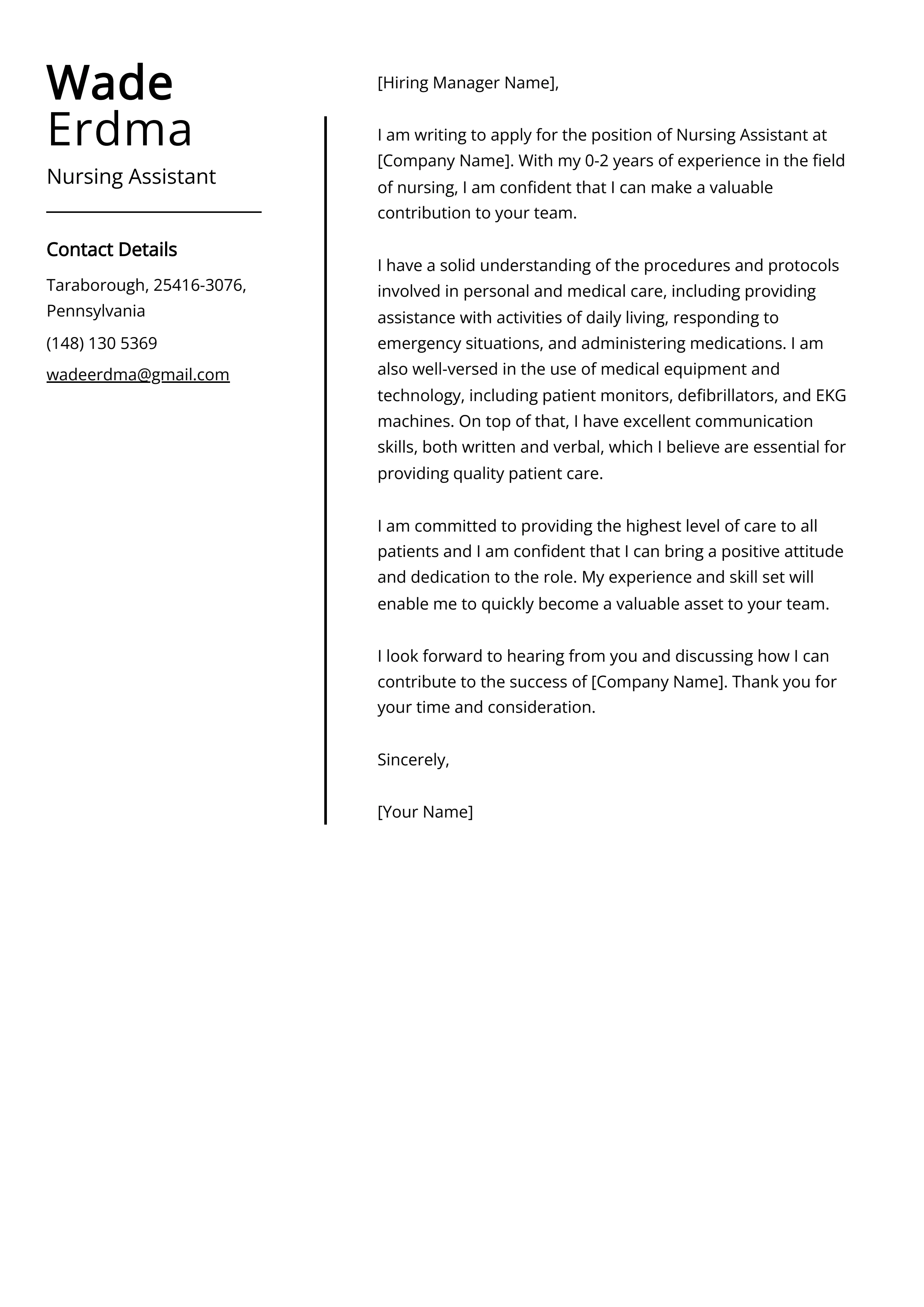
The body paragraphs are where you provide detailed information about your skills and experience. This section should highlight your key accomplishments and explain how they relate to the job requirements. Use this space to showcase your ability to perform the duties of a Nursing Assistant and to demonstrate how you have successfully performed similar tasks in previous roles. This is where you prove that you possess the necessary skills and qualifications. The body paragraphs should be well-organized, using specific examples and concrete evidence to support your claims. Each paragraph should focus on a different aspect of your skills or experience, making it easier for the hiring manager to understand your qualifications.
Emphasizing Relevant Experience
Focus on the experience that is most relevant to the nursing assistant position. Describe your previous roles, responsibilities, and achievements, using clear and concise language. Avoid simply listing your duties; instead, explain how you handled various situations and the positive outcomes. Tailor your examples to match the specific requirements of the job description. This helps the hiring manager see how your experience directly aligns with the facility’s needs. Include specific tasks you performed, such as assisting with patient care, taking vital signs, or maintaining patient records. The goal is to demonstrate your hands-on experience and abilities. Use strong action verbs to describe your accomplishments and the value you provided in your previous roles. This paints a more dynamic picture of your abilities.
Quantifying Achievements and Responsibilities
Whenever possible, quantify your achievements with specific numbers and data. This provides concrete evidence of your skills and the value you can bring to the role. Instead of saying you ‘managed patient care’, state ‘provided care for a ward of 20 patients’. Quantifying your accomplishments makes your statements more credible and shows the hiring manager the real-world impact you’ve had. Include the number of patients you have cared for, the types of medical procedures you have assisted with, and any improvements you achieved. By providing tangible results, you demonstrate your effectiveness and reliability as a nursing assistant. Examples include reducing patient falls, improving patient satisfaction scores, or efficiently managing daily tasks within a specific timeframe. This level of detail strengthens your claims.
Showcasing Soft Skills
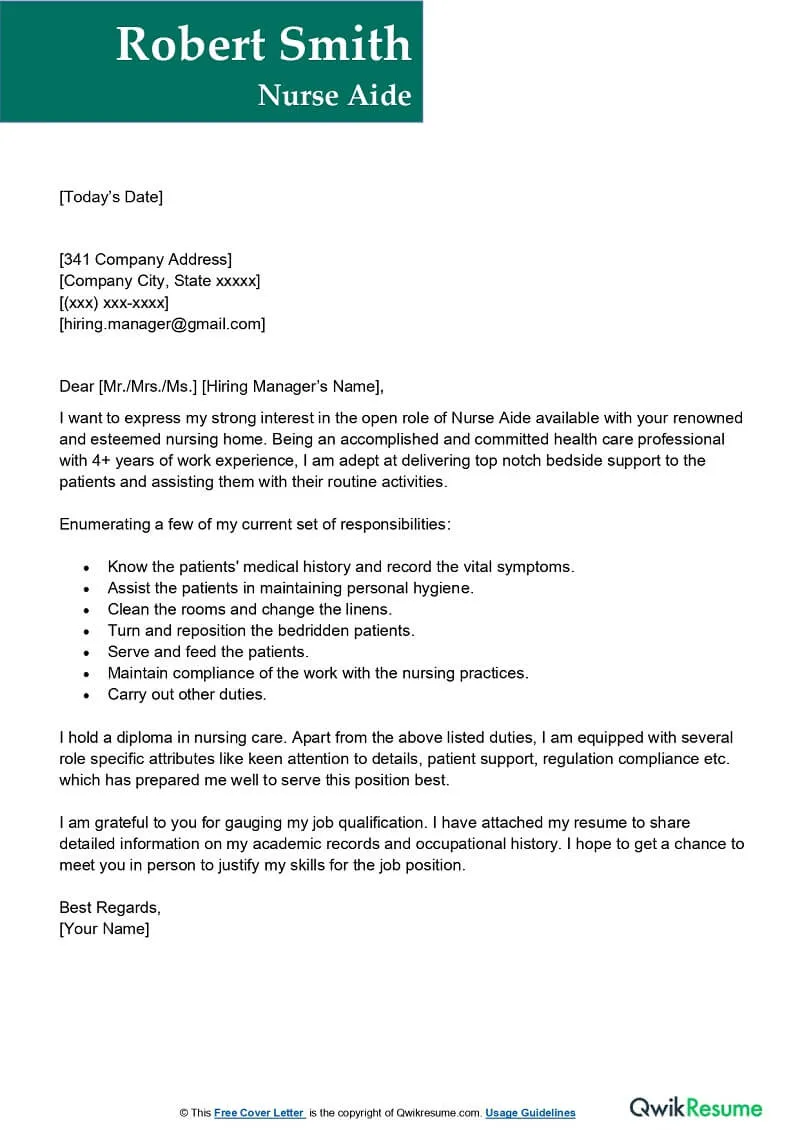
Soft skills are just as important as technical abilities in nursing. Demonstrate your interpersonal and communication skills in your cover letter. Emphasize your ability to work well in a team, communicate effectively with patients and their families, and demonstrate empathy and compassion. Provide examples of how you have used these skills in previous roles. Nursing assistants must be able to handle stress, manage difficult situations, and maintain a positive attitude. Show that you have these qualities by providing specific instances where you demonstrated these skills, such as resolving patient conflicts or providing emotional support. Highlight your ability to adapt to changing situations, and to work cooperatively with other healthcare professionals. The ability to showcase soft skills can significantly enhance your application.
Highlighting Your Certifications
Make sure to include all relevant certifications. Most Nursing Assistant positions require certifications such as Certified Nursing Assistant (CNA), Basic Life Support (BLS), and First Aid. Clearly state your certifications and the issuing organization in your cover letter. Make sure your certifications are up-to-date. Certifications demonstrate that you are trained and qualified to provide care to patients and are often a minimum requirement for employment. Include dates of certification or any renewal information. Also, mention any additional training or special skills, such as experience with specific medical equipment or patient populations. Highlighting these certifications shows that you meet the necessary requirements and have the skills to perform the job effectively, helping you stand out from other applicants.
The Closing Paragraph and Call to Action
The closing paragraph should summarize your interest in the position and reiterate your qualifications. It should also include a call to action, encouraging the hiring manager to take the next step. Ensure that your closing leaves a positive and lasting impression. This section is your final opportunity to reinforce why you are the ideal candidate. It is important to be direct and confident in your request for the hiring manager to contact you. End with a professional and polite closing, and include your contact information.
Expressing Enthusiasm for the Position
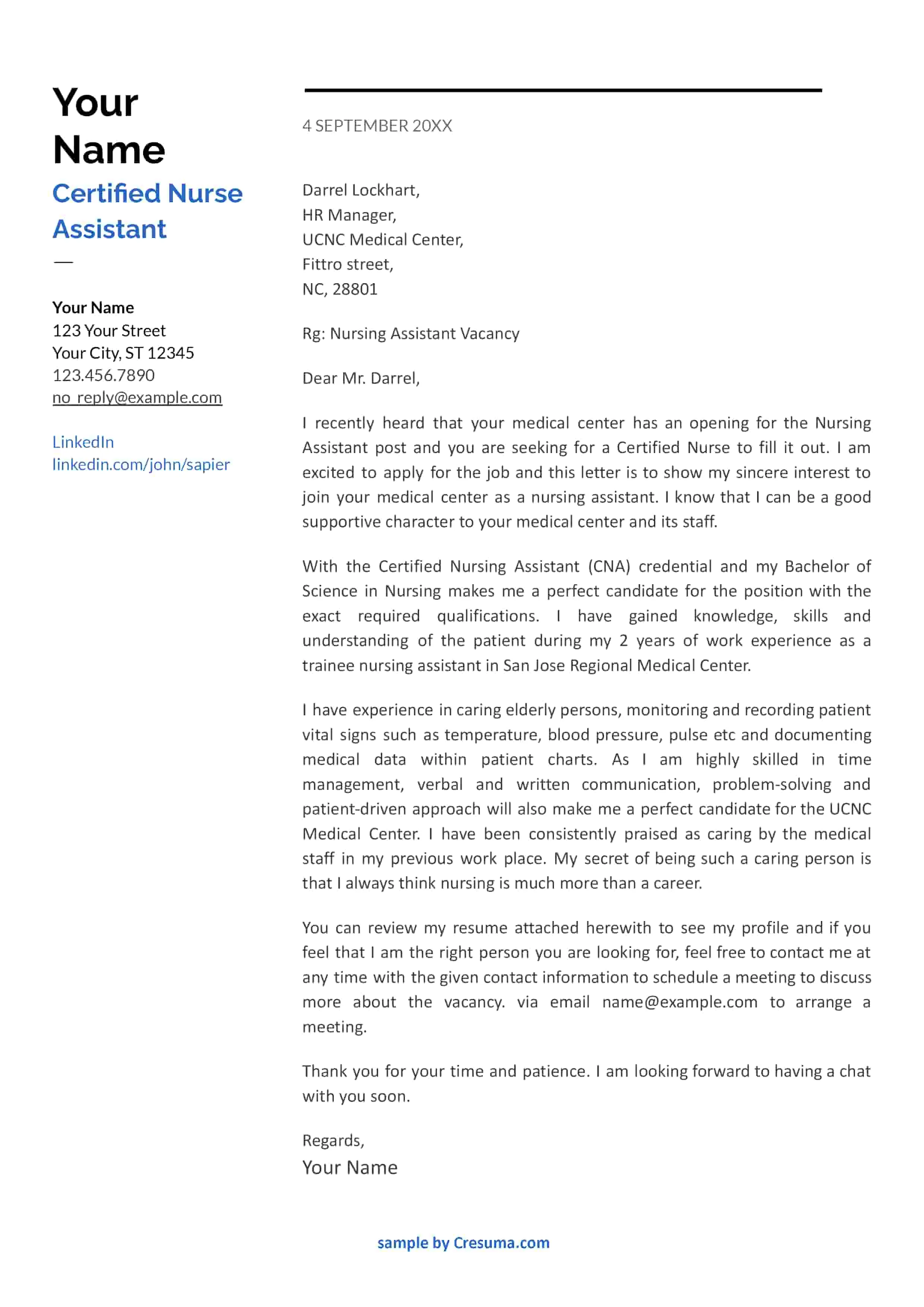
Reiterate your enthusiasm for the specific position and the healthcare facility. Explain why you are particularly interested in this opportunity and how it aligns with your career goals. Refer to the job description to show that you understand the role and the facility’s needs. Express your commitment to providing excellent patient care and being a valuable member of the team. This shows that you have a genuine interest in the role and demonstrates your enthusiasm for the position. Your goal is to leave the hiring manager with a positive feeling about you and your potential contributions to the healthcare facility.
Suggesting a Follow-Up
End your cover letter with a clear call to action. Suggest that you would like to discuss your application further and arrange an interview. Provide your contact information once more and express your availability. For example, you can state that you are available for an interview at their earliest convenience. By including a specific call to action, you signal that you are eager to move forward in the hiring process. Indicate your preferred method of contact. This gives the hiring manager clear direction on how to proceed. Thank the hiring manager for their time and consideration. This shows professionalism and appreciation for the opportunity. A well-crafted closing with a call to action significantly boosts your chances of getting an interview.
Proofreading and Editing Your Cover Letter
Before submitting your cover letter, carefully proofread and edit it. Errors in grammar, spelling, or punctuation can create a negative impression and undermine your qualifications. Check for any inconsistencies in formatting or style. Use a grammar and spell-checking tool but also read the letter yourself, as these tools may not catch every error. Ask a friend or family member to review your letter for clarity and accuracy. Proofreading shows that you pay attention to detail. Ensure that your cover letter is free of any errors, as these are easily avoided. Errors can make you appear careless. A well-edited cover letter demonstrates your professionalism and attention to detail, increasing your chances of success.
